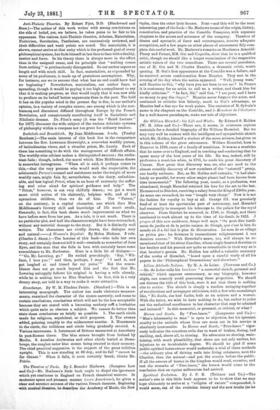Anti-Theistic Theories. By Robert Flint, D.D. (Blackwood and Sons.)—The author
of this work writes. with strong convictions on the side of belief, yet, we believe, he takes pains to be fair to his opponents. The various Anti-Theistic theories, Atheism, Materialism, Positivism, Secularism, Pantheism, are successively reviewed, and their difficulties and weak points are noted. The materialist, it is shown, cannot arrive at that unity which is the professed goal of every philosophical system, but finds himself at last face to face with aduality, matter and force. In his theory there is always more in the effect than in the assigned cause, and its principle that "nothing comes from nothing" is pertinaciously disregarded. So our author argues at length and with much skill. In fact, materialism, as expounded by some of its professors, is made up of gratuitous assumptions. Why, for instance, are we to assume that what has no end could have had no beginning ? Nevertheless, materialism, our author fears, is spreading, though it would be paying it too high a compliment to say that it is making progress, as that would imply that it was now able to produce on its behalf better arguments than in the past. The hold it has on the popular mind in the present day is due, in our author's opinion, to a variety of complex causes, one among which is the rest- lessnese and discontent diffused throughout Europe by the French Revolution, and conspicuously manifesting itself in Socialistic and Nihilistic dreams. Dr. Flint's essay (it was the "Baird Lecture" for 1877) discusses the wide subject of the various Atheistic systems of philosophy within a compass not too great for ordinary readers.


































 Previous page
Previous page